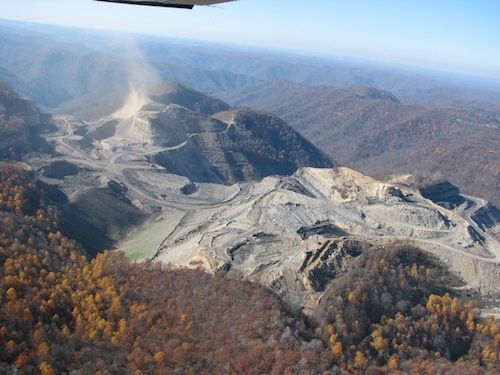UN human rights group calls for investigation of mountaintop removal mining in Appalachia

After visiting West Virginia communities affected by mountaintop removal coal mining, the United Nations Working Group on Business and Human Rights is calling for an investigation into allegations of human rights abuses related to the practice, in which mountaintops are blasted off and the resulting waste dumped into streams below.
Working group members visited Twilight and Lindytown in rural Boone County, W.Va. After buying up land in and around Lindytown, Virginia-based Massey Energy destroyed much of the community in 2010 to expand a mountaintop removal operation; the few residents who opted to stay live in fear of being crushed by falling rock. Less than two miles away, Twilight residents have been fighting to avoid the same fate. Massey was bought by Alpha Natural Resources of Abingdon, Va. following the 2010 disaster at its Upper Big Branch Mine in Montcoal, W.Va. that killed 29 miners.
The working group members also met with officials at the West Virginia Department of Environmental Protection, the West Virginia Coal Association, and representatives of groups opposed to mountaintop removal, including the Blair Mountain Heritage Alliance, Coal River Mountain Watch, Keepers of the Mountains, the Ohio Valley Environmental Coalition (OVEC), and the West Virginia Highlands Conservancy.
According to a working group statement about the visit released yesterday by the nonprofit environmental law firm Earthjustice:
We have heard allegations of significant adverse human rights impacts, most notably related to the enjoyment of the rights to health and water. Other concerns raised to us include lack of compliance with regulatory standards concerning access to and protection of cemeteries, lack of consultation and lack of effective remedy. The Working Group also heard allegations of intimidation, threat and harassment of individuals and groups who are vocal in their opposition to surface mining production. The Working Group urges that these allegations be investigated and addressed as soon as possible. In line with the Global Principles, the [Working Group] also urges companies engaged in surface mining production to take any necessary steps to prevent, mitigate and address any adverse impacts and account for how such impacts are addressed, and for business entities linked to any adverse impacts to seek to prevent or mitigate such impact.
The working group will prepare a detailed report of findings and recommendations to be presented to the U.N. Human Rights Council in Geneva, Switzerland in June 2014. The council established the working group in June 2011 to implement the U.N. Guiding Principles on Business and Human Rights, which set the first global standards for preventing and addressing harm to human rights from business activity.
"We are heartened to see the U.N. Working Group explore the human rights impacts of mountaintop removal mining in the U.S., and we look forward to the Working Group’s recommendations," said Earthjustice attorney Jennifer Chavez.
Chavez called on the Obama administration to stop issuing permits for mountaintop removal mines and for the Environmental Protection Agency (EPA) to set a federal water quality standard for mountaintop removal pollution. She also urged Congress to address the health problems associated with the practice by passing the Appalachian Community Health Emergency (ACHE) Act, which would impose a moratorium on mountaintop removal mining until further studies are conducted into its health risks for nearby communities. Studies done to date have linked living near mountaintop removal mining sites with elevated rates of birth defects, cancer, death from chronic cardiovascular disease, mental health disorders, and psychological stress.
The U.N.'s call for an investigation into human rights abuses related to mountaintop removal comes amid increasing scrutiny of the practice here at home:
* This week, the Congressional Research Service issued a report titled "Mountaintop Mining: Background on Current Controversies," which examines the debate over the practice, including concerns about its environmental and health impacts.
* Last week, an independent group of U.S. physicians and scientists looking into mountaintop removal called for an immediate moratorium until more research is done on its health effects.
* Also last week, a federal appeals court unanimously ruled that the EPA has the legal authority under the Clean Water Act to revoke a permit for a mountaintop removal mining operations issued by the U.S. Army Corps of Engineers. The case involved a Mingo Logan Coal Co. operation in West Virginia's Logan County, which is next to Boone County where the U.N. working group visited.
Tags
Sue Sturgis
Sue is the former editorial director of Facing South and the Institute for Southern Studies.
